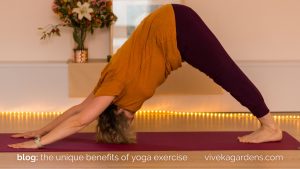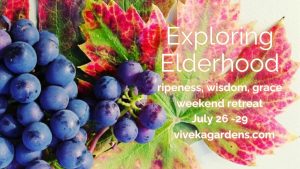
I was looking at this picture of me taken five or six years ago. I didn’t have the extra 15kgs, still had blond highlights to cover my emerging silver, and I was probably just realising that my periods had finished for good. By the way, the pic goes with a great blog that comprehensively describes the benefits of yoga exercise – recommended, even if I say so myself.
My ‘tummy of wisdom’ now hinders me from doing some of the yoga postures I enjoyed but there is grace in acceptance. I still offer the classic hatha practice class, but it’s less strong. And as many of you know, there’s a lot of simple lying down and breathing yoga here at VG. The changes in my body, the changes in how I am seen and heard, the changes in my spirit and my aims all got me wondering about elderhood. What does it mean to be an elder? How am I going to inhabit my elderhood?
Way back when I was studying Biology I was struck by a piece by an evolutionary psychologist, wondering on the biological purpose of menopause. Very few other mammals stop reproducing long before the end of their lives; orca whales, strangely, are statistically the most similar to humans, ceasing reproduction in their thirties and living to their seventies. The ‘grandmother hypothesis’ emphasises the extra pair of hands (flippers!), care and life experience that supports the thriving of a daughter of reproductive age and her children. In hunter-gatherer societies, older women remember the cycles, gluts, range of conditions of forage and medicine plants or cultivated varieties of food crops, not only in their lifetime but also passed on from their grandmothers. So there’s guardianship of food knowledge heritage, but also of community and ritual. There is the holding of ‘the old ways and whys’ but also that things change: in other words, wisdom.
Before I go any futher, I want to acknowledge a few painful things. First, the sisters we have known who haven’t made it to post-menopause, may they rest in peace. May we honour their memory, and may their not being here be a spur to honour our elderhood with responsible service. Second, there may be early menopause, and not having children through choice or hard situations, in which cases grief and/or a sense of normative society marginalising can be hard experiences. Third, there exists a long history of the patriarchy feeling either threatened by (see witch hunts, for instance) or dismissing older women and their wisdom. Like it or not, there can still be a shadow of feeling we are not good (slim, attractive etc) enough, and even shame about growing older, which mean we diminish our worth. It’s hard not to absorb the patriarchy. All stuff to work on, and all the more reason to be strong about our elderhood, and be open to growth.
In growing into elderhood we need sisterhood and being seen by each other. At about the time of this photo I was arriving at a women’s festival and from about five metres away a woman asked if I’d like to attend an elders’ circle, it was something she was trying. I actually turned around behind me because I assumed she couldn’t be talking to me. Once I got over my offence and laughed, and recognised a kindred soul who risks things, I went along. As we were settling a young woman, about 20, puppyishly put her head under the tent flaps and asked if she could sit in. The facilitator asked the group, it was set up as a group for older women but would we mind. Nobody said anything, but finally I piped up. We needed to explore this among ourselves. In the back of my mind I had something about how excluded groups need to find their own community first. In exploring elderhood we need each other. On our day retreat, we can honestly be ourselves away from the needs of another generation. 
Beyond the grandmother hypothesis, however, what is the need for wise, older women? Just as our mothers and grandmothers witnessed enoromous changes in the 20th century, society is going through enormous change. We provide a mooring to how to live before digital, for instance (if we can remember that far back). Maybe part of the elderhood enquiry is an inventory of things we understand that are not known by younger others. Do you have a specialist area? Likely we know about bereavement one way or another. How do we prepare others for dying and death?
What does it mean to be an elder? How am I going to inhabit my elderhood? This is what we can dream into on our weekend retreat with restoriative yoga, yoga nidra, vegan soulfood, circle and time on the land.
As an added bonus I’m offering participants who want to take their exploration further 15% of a set of four coaching sessions (sliding scale according to household income) https://vivekagardens.com/coaching/
https://www.facebook.com/reel/140657902460047
Contact me, Fiona